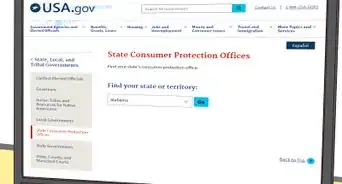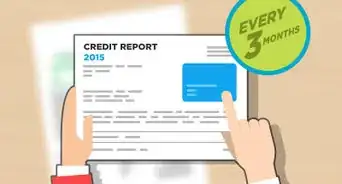This article was co-authored by Clinton M. Sandvick, JD, PhD. Clinton M. Sandvick worked as a civil litigator in California for over 7 years. He received his JD from the University of Wisconsin-Madison in 1998 and his PhD in American History from the University of Oregon in 2013.
There are 9 references cited in this article, which can be found at the bottom of the page.
This article has been viewed 20,909 times.
You should report the use of a stolen Social Security Number to many different government agencies. Start with local law enforcement, which can investigate identity theft and other illegal uses of stolen Social Security Numbers. Also report to the Social Security Administration (SSA), which has an online complaint form. If you suspect that the Social Security Number (SSN) was used to obtain government benefits, then you should report benefits fraud as well.
Steps
Reporting SSN Theft to Law Enforcement
-
1Contact your local police. You should report a stolen Social Security Number to local law enforcement. If a person bought a stolen Social Security Number, then they probably are using it to commit other crimes as well.
- Many police have tip lines that you can call. They may also have online tip forms you can complete and submit.
- To find the phone number and address, look in your phone book.
-
2Report anonymously, if you want. You can also report anonymously to local police. You might want to report anonymously if you are afraid of the suspect. However, it’s also a good idea to give your name, since the police can reach out to you to testify, if need be, in the future.
- To report anonymously, you should use the online tip form or call a helpline from a pay phone if you are worried about the police tracing your call.[1]
- Many cities also participate in the Crime Stoppers program. This program collects anonymous tips for local police. You can find a Crime Stoppers phone number by checking “your city” and “Crime Stoppers” online.
Advertisement -
3Share information with the police. Tell the police your suspicions and provide as much information as you can. If you are willing to share your name, then also give the police your phone number so that they can contact you if they need follow-up information.
-
4Testify in court if the state prosecutes the criminal. You may be asked to testify in court. You can prepare by talking with the prosecutor. On the day of trial, remember the following tips for being an effective witness:[2]
- Always tell the truth. You will be testifying under oath and it is illegal to lie.
- Listen closely to the question. If you don’t understand a question, ask for clarification.
- Think before answering.
- Always stay calm. The worst thing is to get rattled.
- Explain your answer. The attorney might want a “yes” or “no” answer, but always ask, “Can I explain?” If the defense attorney won’t let you explain, then the prosecutor might be able to follow up.
Contacting Relevant Government Authorities
-
1Visit the Inspector General’s website. The Social Security Administration has an Inspector General who investigates fraud involving Social Security Numbers. You should visit the website so that you can report the fraud.[3]
-
2Decide whether to report anonymously. SSA gives you several options for maintaining your anonymity. For example, you can report and choose the following level of confidentiality:[4]
- Remain anonymous. You won’t fill out the contact information on the online form. However, SSA cannot contact you if they need more information.
- Remain confidential. SSA won’t share your name with anyone outside the office and will only release your name if ordered by a court. By choosing this option, you allow SSA to contact you for follow-up information.
- Don’t request confidentiality or anonymity. You allow SSA to release your name.
-
3Submit the online form. SSA will request information that will help in the investigation of the stolen Social Security Number. You should provide the following information:[5]
- whether you are filing as an individual or part of a business
- your name
- your address
- your email address
- your phone numbers (home, work, and cell)
- your Social Security Number
- information about your business (if applicable)
- the name of the person using the stolen SSN
- the person’s contact information (address, phone number)
- the person’s date of birth and state of birth
- the person’s sex and race
- information on anyone who might have been defrauded because of the stolen SSN
- details of the fraud
-
4Provide additional information, if requested. If SSA needs additional information from you, then provide that information promptly. However, SSA will not keep you updated about the investigation.
-
5Call SSA instead. If you don’t want to use the online form, then you can report fraud over the phone. You can call toll-free 1-800-269-0271 from 10:00 am to 4:00 pm Eastern Standard Time.[6] If you reported online, then you don’t need to call.
- If you can’t call during the day, then you can call any Social Security office or call the SSA’s toll free number, 1-800-772-1213. Your information will be taken and then forwarded to the Inspector General.
-
6Write a letter to SSA instead. You might want to report fraud to SSA by mail. If so, you can include all of the information that you would report online, and send the letter to Social Security Fraud Hotline, PO Box 17785, Baltimore, MD 21235.[7]
- You might also fax the letter to 410-597-0118.
-
7Report food stamps fraud. A person with a stolen Social Security Number may be using it to obtain food stamps. You can report suspected food stamps fraud by telephone. Your report will be confidential. Call toll-free at 1-800-424-9121 or 202-690-1622. If you are deaf or hard of hearing, then call 202-690-1202.[8]
- You can also report the suspected fraud by sending an email to usda_hotline@oig.usda.gov.
- Alternately, you could write to United States Department of Agriculture Office of Inspector General, PO Box 23399, Washington, DC 20026-3399.
- You might also report the fraud to your state’s hotline.
-
8Report other benefits fraud to state or local agencies. There should be an agency in your state where you can report other kinds of benefits fraud. Search online for “your state or city” and “benefit fraud.” In Macon County, North Carolina, for example, you can report the following information to the Social Services Program Integrity Investigator:[9]
- the person’s name
- his or her address
- the person’s contact information
- the person’s workplace
- the names of people living in the home
- why you suspect fraud
Identifying SSN Theft
-
1Recognize crimes against the Social Security Administration. The Social Security Administration (SSA) investigates certain kinds of fraud committed using stolen Social Security Numbers. For example, you can report the following to SSA:
- Someone used the stolen SSN to make a claim. It is illegal to provide false information when applying for Social Security benefits, so SSA can investigate if the person used the number to get benefits.[10]
- Someone is buying or selling counterfeit cards. SSA will also investigate this crime as well.
-
2Identify what benefits the thief illegally receives. Often, someone will use a stolen Social Security Number in order to gain access to different government benefits programs. They use the stolen SSN because they otherwise would not qualify. You should identify what benefits, if any, the person has obtained using the stolen SSN. For example:
- food stamps
- housing assistance
- health insurance, such as Medicare or Medicaid
-
3Understand identify theft. Stealing a Social Security Number is a central part of identity theft. After stealing the number, the thief can open up credit cards, take out loans, or gain access to the victim’s bank accounts.
- Increasingly, identity thieves also steal identities to get prescription drugs or medical records. The person poses as you at a doctor’s office in order to receive medical treatment or to obtain prescription drugs, which they use or sell.[11]
- You should report all of these crimes to law enforcement and other agencies. See Report Identity Theft for more information.
References
- ↑ http://blogs.findlaw.com/blotter/2012/12/should-you-report-a-crime-anonymously.html
- ↑ https://www.justice.gov/usao-mdpa/victim-witness-assistance/tips-testifying-court
- ↑ https://www.ssa.gov/fraudreport/oig/public_fraud_reporting/form.htm
- ↑ https://www.ssa.gov/fraudreport/oig/public_fraud_reporting/form.htm
- ↑ https://www.ssa.gov/fraudreport/oig/public_fraud_reporting/form.htm
- ↑ https://oig.ssa.gov/report-fraud-waste-or-abuse/fraud-waste-and-abuse
- ↑ https://oig.ssa.gov/report-fraud-waste-or-abuse/fraud-waste-and-abuse
- ↑ http://www.fns.usda.gov/fraud/how-can-i-report-snap-fraud
- ↑ http://maconnc.org/dss-benefit-fraud.html


































































